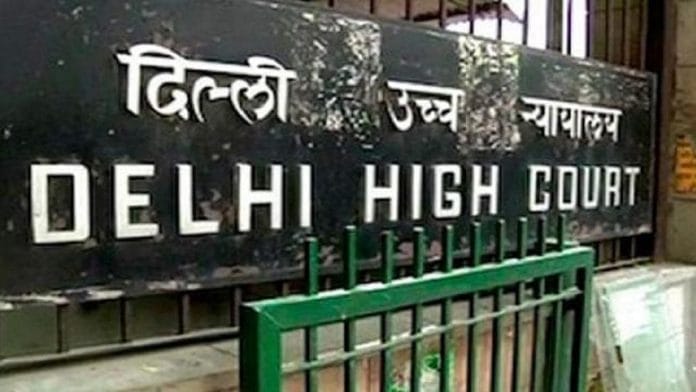New Delhi: Pointing out that no rationale was given for requiring senior Axis Bank officials to appear personally before the National Commission for Scheduled Tribes (NCST) in a case where the bank had attempted to exercise its mortgage rights, the Delhi High Court last week stayed the commission’s orders for the same passed in July and October this year.
The court was hearing a case involving a Maharashtra-based man who had filed a complaint with the NCST alleging commission of atrocities against him in reference to the bank’s move to claim property mortgaged by him after loan default.
He invoked Section 3(1)(f) and (g) of the Scheduled Castes and Scheduled Tribes (Prevention of Atrocities) Act, which penalise wrongful occupation or cultivation of land, owned by, in possession of or allotted to an SC or ST person, or wrongful dispossession of an SC or ST person from their land premises or interfering with the enjoyment of their rights over the land.
The NCST had subsequently summoned officials of the bank, which moved the high court against the orders.
Hearing the case, a bench of Justice Sachin Datta ruled that summons issued to the Axis Bank CEO and Managing Director by the commission were without jurisdiction, and added: “Prima facie, in the context of the facts of the present case, Sections 3(1)(f) and (g) of the Act are not attracted (and) the same cannot be invoked to preclude/prevent the exercise of mortgage right/security interest of the petitioner”.
“Issuance of sitting notice and summons are without jurisdiction and merit; and constitutes gross abuse of the process,” it said.
The matter will be taken up for hearing next in February. The court also sought replies from the respondents, including the NCST, within four weeks.
Also Read: Delhi HC ban on ‘shadow libraries’ is pushing Indian researchers up against the paywall
Origin and trajectory of case
The case originated 12 years ago, when a man from the ST community borrowed over Rs 16 crore in the name of his company, Sundev Appliances. In return, an equitable mortgage was created in respect of a property situated in Vasai, Maharashtra, according to the court order.
Three years later, when the man could not pay back the amount he had borrowed, the bank declared his account as a Non-Performing Asset and invoked Section 13(4) of the SARFAESI Act to enforce its security interest and take possession of the mortgaged property. The provision allows lenders to take possession of secured assets if borrowers fail to repay loan.
Subsequently, the court of the District Magistrate, Palghar, on the bank’s appeal, permitted it to obtain physical possession of the property in January last year. But the man approached the court of the civil judge in Vasai, seeking an injunction to prevent the bank from dealing with the property, or making any attachment without his permission. The civil suit is still pending.
In the meantime, the man filed a representation in February before the NCST this year under Sections 3(1)(f) and (g) of the SC/ST (Prevention of Atrocities) Act.
NCST orders
At a July hearing, the NCST issued notice to the bank’s MD and CEO to appear “in person” before it on 22nd of the month.
However, the bank officials claimed that they only received the notice requiring them to appear before the NCST on 25 July, three days after the hearing was scheduled.
Days later, on 29 July, the commission again issued summons to the bank CEO and MD asking them to personally appear before it in August, failing which action will be taken against them.
This led the bank officials to write to the commission seeking withdrawal of the summons and notice issued to them. On 18 August, the bank representatives appeared before the commission and argued that they were entitled to enforce their rights under the SARFAESI Act. They also argued that the man had repressed disclosure of material facts.
Instead of considering the bank’s case, the NCST directed the collector, DM and Superintendent of Police of Palghar to submit a status report in the matter.
On 22 September, the commission also directed that an action report be sent to it within 15 days, while saying that no action should be taken with respect to auctioning of the subject property until complete clarity was obtained about the ownership rights of tribal persons, the high court order records.
On the next date of hearing before the commission, 6 October, summons were once again issued to the bank officials. This is what led them to approach the Delhi HC.
What HC said
In the present case, the high court noted that there was no reason for the commission to issue summons requiring senior officials of the bank to appear before it.
Saying that NCST proceedings were “without jurisdiction”, the court added that in the 2013 verdict in State Bank of India vs National Commission for Scheduled Castes, it had ruled that “senior officers of the petitioner bank or for that matter any other organisation can be summoned by the commission, provided that a need is felt for examining those officers for the purpose of inquiry”.
Such summons to senior most officers or heads of organisations cannot be issued as a matter of routine, the court had said, while adding that it must be considered whether their presence is necessary for the investigation or not.
In the 2013 case, the court also pointed out that the Supreme Court, in several cases like State of Uttar Pradesh vs Jasvir Singh, had deprecated the practice of courts and other tribunals of issuing summons to senior officers without examining the necessity of requiring their presence.
(Edited by Nida Fatima Siddiqui)
Also Read: ‘Can the blind see?’ In Delhi High Court’s landmark order, a big win for disability rights






